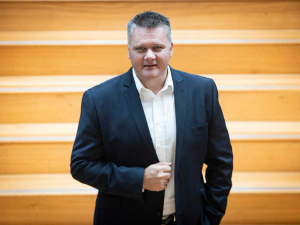Battle for milk
OPINION: Fonterra may be on the verge of selling its consumer business in New Zealand, but the co-operative is not keen on giving any ground to its competitors in the country.
 Fonterra chief executive Miles Hurrell has thanked farmer shareholders and staff for hard work and resilience during the year.
Fonterra chief executive Miles Hurrell has thanked farmer shareholders and staff for hard work and resilience during the year.
A strong result in a year like no other is how Fonterra chief executive Miles Hurrell is describing the co-operative's annual results.
Fonterra farmers will receive a record milk price of $9.30/kgMS, smashing the previous record of $8.40/kgMS set in 2013-14.
With a total dividend of 20c/share, fully shared up farmers will get $9.50/kgMS.
For year ending July 31 2022, Fonterra reported a net profit of $585m from total group revenue of $23.4 billion, which was up 11% on the previous year.
Hurrell says the last financial year has been a year like no other: the co-operative has shown that these challenges make the team stronger.
"In the face of unprecedented macroeconomic events, we have continued to deliver for our farmer owners and New Zealand, delivering $13.7 billion to the domestic economy in milk price payments alone," he says.
He thanked farmer shareholders and staff for hard work and resilience during the year.
Hurrell says despite the challenges, including increased costs associated with supply chain volatility, 2021-22 was a good year for the co-op.
"These results demonstrate that our decisions relating to product mix, market diversification, quality products and resilient supply chain, mean the co-op is able to deliver both a strong milk price and robust financial performance in a tough global operating environment."
While total revenue was higher, sales volumes decreased due to short-term shifts in demand and ongoing shipping and supply disruptions.
Strong margins in the ingredients channel, particularly in the final quarter, resulted in an increase in Fonterra's gross profit.
However, total gross margin was down due to the higher cost of milk on foodservice and consumer channels during the year.
A series of geopolitical and economic events also impacted performance with the co-op writing off $80 million its Sri Lankan business, due to devaluation of the rupee.
Performance was mixed across Fonterra's three regional markets.
Africa, Middle East, Europe, North Asia, Americas (AMENA) saw normalised earnings before interest and taxes (EBIT) jump 57% to $527m due to the improved gross margin in its ingredients channel.
However, Asia Pacific (APAC) normalised EBIT was down 22% to $237 million; improved performance in ingredients channel more than offset by weaker consumer and foodservice channels.
Greater China normalised EBIT was $432 million, up 7%, with an improved performance in its ingredients channel partially offset by lower margins in the foodservice and consumer channels, as a result of the higher cost of milk.
Fonterra’s net debt position rose by $1b to $5.3b, increasing the gearing ratio from 38.5% to 42.4%.
The co-op is putting this down to increased inventory and increased working capital triggered by the higher milk price.
Fonterra chief financial officer Marc Rivers explained that higher inventory than usual at the end of the 2022 financial year was due to stronger milk collections towards the end of the season coinciding with factory constraints, short-term impacts on demand and shipping disruptions.
“Eighty eight percent of our year inventory is contracted, which means the sale price has been agreed and the product contracted, however the inventory had not been shipped at the balance date,” says Rivers.
“The first six weeks of the new financial year have showed good progress with shipment of this inventory. We have flexibility in relation to inventory levels due to the strength of our balance sheet.”
The World Wide Sires National All Day Breeds Best Youth Camp Best All Rounder plaudit has become family affair, with 2026 Paramount Cup winner Holly Williams following in her sister Zara's footsteps.
DairyNZ is giving New Zealand farmers a unique opportunity to gain hands-on governance and leadership experience within the dairy sector.
Herd improvement company LIC has posted a 5.2% lift in half-year revenue, thanks to increasing demand for genetics.
According to the latest Fresh Produce Trend Report from United Fresh, 2026 will be a year where fruit and vegetables are shaped by cost pressures, rapid digital adoption, and a renewed focus on wellbeing at home.
The Roar is a highlight of the game hunting calendar in New Zealand, with thousands of hunters set to head for the hills to hunt male stags during March and April.
OPINION: The past few weeks have been tough on farms across the North Island: floods and storms have caused damage and disruption to families and businesses.

OPINION: Meanwhile, red blooded Northland politician Matua Shane Jones has provided one of the most telling quotes of the year…
OPINION: This old mutt has been around for a few years now and it seems these ‘once in 100-year’ weather…